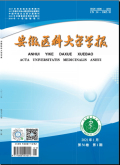安徽医科大学学报2024,Vol.59Issue(6):947-951,5.DOI:10.19405/j.cnki.issn1000-1492.2024.06.004
抗核抗体阳性及干预治疗与反复种植失败辅助生殖结局相关性研究
Study on the correlation between positive antinuclear antibody and intervention therapy and assisted reproductive outcome of repeated implantation failure
摘要
Abstract
Objective To investigate the impact of positive antinuclear antibody(ANA)and subsequent interven-tion therapy on the assisted reproductive technology outcomes among the patients experiencing recurrent implanta-tion failure(RIF).Methods A retrospective study was conducted on 344 RIF patients.Based on ANA test re-sults,the patients were divided into ANA-positive group(294 cases)and negative control group(50 cases).The ANA-positive group was further divided into a low titer group(214 cases)and a high titer group(80 cases).Com-parative statistical analyses such as the Wilcoxon rank-sum test,Mann-Whitney U test,Kruskal-Wallis test and chi-square test,etc.were employed to evaluate differences in general clinical data,embryo-related parameters,and pregnancy outcomes between the positive and negative groups.The impact of ANA on the assisted reproductive out-comes of patients with recurrent implantation failure was analyzed,and the outcomes of ANA-positive patients after intervention therapy were also analyzed.Results Notably,the clinical pregnancy rates of patients in the ANA-pos-itive low titer group and high titer group were significantly lower than those in the negative control group(P<0.001).Similarly,the rates of fertilization and cleavage of oocytes in ANA-positive patients were also significantly lower than those in the negative control group(P<0.05).For patients who did not achieve pregnancy after embryo transfer due to ANA positivity,immunomodulatory therapy significantly improved both the clinical pregnancy rate and cumulative clinical pregnancy rate(P<0.05).Conclusion Compared with the negative control group,the clinical pregnancy rates decrease in both ANA-positive low titer subgroup and high titer subgroup.However,clini-cal intervention therapy enhances the single-cycle clinical pregnancy and cumulative pregnancy rates among ANA-positive patients,indicating that ANA positivity is an important factor in RIF.Immunomodulatory therapy is an ef-fective measure to improve recurrent implantation failure among ANA-positive patients.关键词
抗核抗体/不孕症/反复种植失败/临床结局Key words
antinuclear antibody/infertility/repeated implantation failure/clinical outcome分类
医药卫生引用本文复制引用
肖会,朱雯,杨帆,陈宇鸽,王冠雄,吴欢..抗核抗体阳性及干预治疗与反复种植失败辅助生殖结局相关性研究[J].安徽医科大学学报,2024,59(6):947-951,5.基金项目
国家自然科学基金(编号:81971441) (编号:81971441)
国家自然科学基金(编号:81901541) (编号:81901541)
安徽医科大学研究生科研项目(编号:YJS20230123) (编号:YJS20230123)

